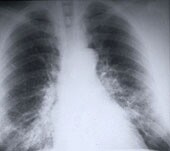
MONDAY, March 22 (HealthDay News) — Researchers have identified gene variations linked with an increased risk for lung cancer in people who have never smoked.
The international research team analyzed DNA from more than 1,000 people with lung cancer and cancer-free people who had never smoked and found strong evidence that two variations in a gene called GPC5 were associated with lung cancer in people who had never smoked. The variations reduce expression of GPC5, the study authors explained.
Further investigation revealed that GPC5 expression levels were 50 percent lower in lung cancer tissue from people who had never smoked, compared with lung tissue from cancer-free non-smokers.
The findings suggest that GPC5 could be a new target for further research and drug development and could be used to identify non-smokers at high risk for lung cancer.
The study findings are published online in The Lancet Oncology.
“Even though this study reports a two-fold reduction in GPC5 expression in [lung cancer] tissues compared to matched normal controls, it is far from clear how reduced GPC5 expression could predispose individuals to lung cancer,” Dr. Ramaswamy Govindan, of Washington University School of Medicine in St. Louis, wrote in an editorial accompanying the study. “More studies are needed to confirm these preliminary observations in the tumor samples from those with no history of tobacco smoking.”
More information
The U.S. National Cancer Institute has more about lung cancer risk.

